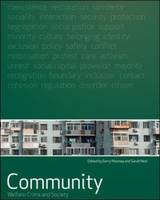


|
|
|
books
| book details |
Community: Welfare, Crime and Society
By (author) Gerry Mooney, By (author) Sarah Neal

|
| on special |
normal price: R 1,220.95
Price: R 1,159.95
|
| book description |
'This text provides an excellent basis for engaging students with the issues surrounding both the idea of 'community' in relation to social policy and the complex processes of policy formation and implementation with a 'community' dimension. Essentially it offers a practical critique based on a combination of a clear, intellectual engagement and well developed illustration. A particular strength is the inclusion of material which gets beyond the immediate context of the UK and draws on examples from colonial and post-colonial practice in the management of 'problem populations'. The book will be of great value to both undergraduate students across the social sciences and to students undertaking professional programmes in social work, community work and related fields' - Professor David Byrne, School of Applied Social Sciences, University of Durham, UK. The concept of community is among the most contested of social science ideas. At the heart of this book is an examination of the concept's unique ability to represent the notion of collective well-being and positive social relations and to denote a description or categorisation of social problems and 'problem populations'. This paradox makes the idea of community particularly valuable for understanding the diverse and complex ways in which social welfare and crime control policies affect each other. The chapters are organised to make sense of community in a range of ways: as a theoretical, political and populist discourse; as a vehicle for policy interventions; as an instrument of social governance and social ordering; and as a basis of collective action. The book considers community within historical and contemporary contexts, in the UK and internationally. It highlights many of the key social science debates as well as a diverse range of early 21st century policy agendas and social issues, such as social cohesion, community safety and anti-social behaviour. Each chapter highlights issues of evidence and the role that different forms of social data play in the analysis of ideas of community and communities. Community is a key text for students on social policy, sociology, criminology and general social sciences courses. Contributors: John Clarke, Allan Cochrane, Gordon Hughes, Gerry Mooney, Sarah Neal, Janet Newman, Sharon Pinkney, and, Esther Saraga.
| product details |

Normally shipped |
Publisher | Open University Press
Published date | 1 Dec 2008
Language |
Format | Hardback
Pages | 208
Dimensions | 254 x 193 x 20mm (L x W x H)
Weight | 1g
ISBN | 978-0-3352-2933-8
Readership Age |
BISAC | political science / public policy / social policy
| other options |
|
|
|
To view the items in your trolley please sign in.
| sign in |
|
|
|
| specials |
|
Our moment has seen the resurgence of an anarchist sensibility, from the uprisings in Seattle in 1999 to the Occupy movement of 2011.
|

|
Carl Morrow
Paperback / softback
160 pages
was: R 320.95
now: R 288.95
|
In this uniquely Southern African book, Carl Morrow and Keith Kirsten guide readers step by step into the magical realms of bonsai as a hobby, horticultural practice and art form.
|

|
André Alexis
Paperback / softback
176 pages
was: R 280.95
now: R 252.95
|
A pack of dogs are granted the power of human thought - but what will it do to them? A surprising and insightful look at the beauty and perils of consciousness.
|
|
|
|